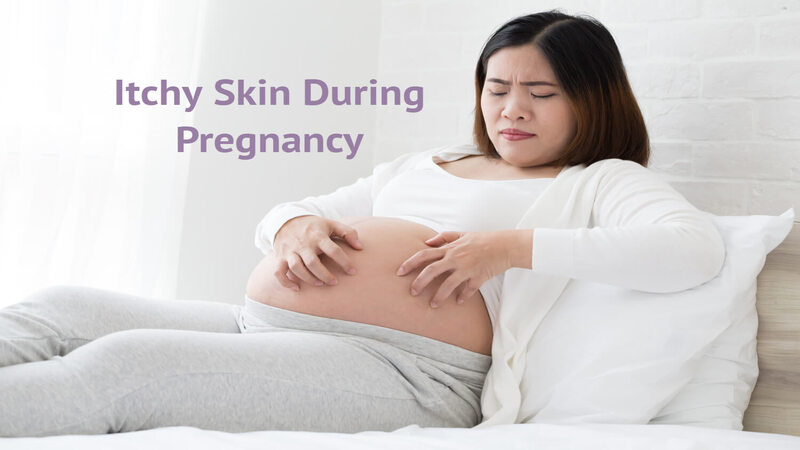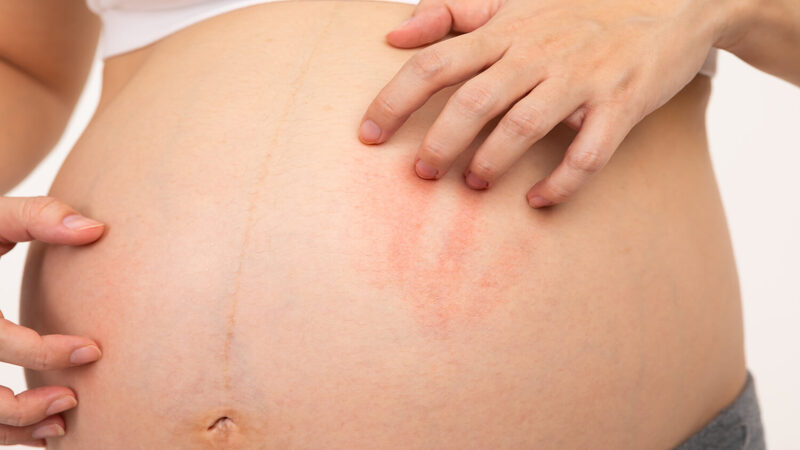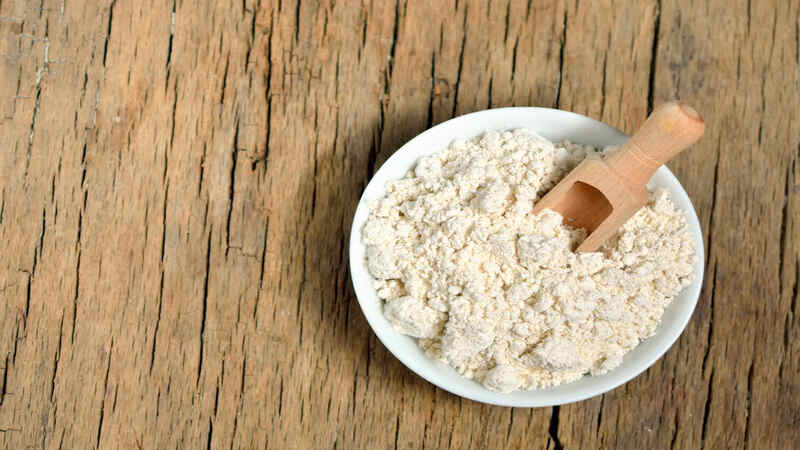
Though pregnancy is a wonderful time there are a few annoying conditions associated with it. Dry and flaky skin is one of the issues. Itchiness or pruritus is another one of them. Find out Itchy Skin During Pregnancy: Treatment for Fast Relief. You would notice that the bigger your bump gets, the itchier it bears one of the issues comes.
As your body expands to accommodate the baby, many pregnant women experience mild itching on the belly, hips, thighs, and breasts. A lot of pregnant women also complain of itching in their palms and soles. According to experts, this itch is due to an increase in the quantity of estrogen. The condition usually vanishes soon after delivery.
Video – Itchy Skin During Pregnancy
Symptoms of Itchy Skin During Pregnancy
Mild itching is quite common in pregnancy. The chief causes of pregnancy-itching are enumerated as under:
1. Dry Skin
Xerosis or dry skin can lead to an itchy, annoying skin condition. Skin dryness can be due to many factors such as cold and hot weather, excessive exposure to air conditioning or heating, and too much bathing or washing. Some soaps and body washes can also be harsh on the skin and cause itching
2. Growing Abdomen
As the pregnancy advances, your abdomen increases in girth. Therefore, the abdominal skin stretches to accommodate the growing baby. This makes the abdominal skin itch.
3. Skin Ailments
Skin infections such as eczema, psoriasis, lice, scabies, hives, etc., can also cause skin itching. Eczema usually gets worse during pregnancy. Some women feel that their condition of psoriasis does improve during pregnancy
4. Internal Diseases
Itching is noted in internal diseases, namely malabsorption of wheat (celiac disease), liver problems, kidney problems, thyroid problems, iron deficiency anemia, leukemia, lymphoma, etc.
[Read: Skin Tags During Pregnancy]
Causes of Itchy Skin In The First Trimester
A higher degree of hormones is at play as soon as you conceive, and this makes your skin extremely sensitive. Delicate skin can feel itchy for a variety of reasons – skin dryness, wearing tight clothes, hot showers, etc., to name a few.
Itchy Skin In The Second Trimester

Severe skin itching commonly seen in the second trimester of pregnancy is due to ICP or intrahepatic cholestasis of pregnancy. It is a condition whereby the liver does not flow normally and smoothly in tiny ducts of your liver. This causes the accumulation of bile salts in your skin and renders it itchy. This kind of itch is very intense and becomes worse at night.
Itchy Rashes During Pregnancy
Some possible reasons that can cause itchy rashes on your body during pregnancy are enlisted below. However, the symptoms can often be subsets of each other, so do not try to diagnose or self-medicate yourself. Seek your doctor’s advice.
1. PUPPP (Pruritic Urticarial Papules and Plaques of Pregnancy)
Some pregnant women develop a characteristic condition called PUPPP or pruritic urticarial papules and plaques of pregnancy. The common symptoms of PUPPP are red itchy bumps and large. Hive-like patches on bellies. PUPPP is also called polymorphic eruption of pregnancy. This condition is common in the third trimester and is more severe in twin pregnancies and in women delivering their first baby.
The precise cause of PUPPP is still unknown. The eruptions of PUPPP appear first on the abdomen and spread to the buttocks, thighs, and back while your arms and legs are often spared. Your doctor will prescribe a topical steroidal ointment for relieving the condition. Oral steroids are advised if the condition worsens. PUPPP is not at all a threatening condition and usually disappears soon after delivery.
2. Prurigo of Pregnancy
It is a condition characterized by the appearance of many small bumps looking like bug-bites initially. Later on, because of constant scratching, they appear as little cuts with crust on them.
Prurigo of pregnancy is seen in the late second trimester and early third trimester. They can be treated with topical ointment and antihistamines. Severe forms are cured by oral steroids. Like PUPPP, this condition also disappears with the birth of the newborn and does no damage to the health and wellness of the baby.
3. Pemphigoid gestationis
This is a rare condition seen during pregnancy. Here, the expecting mother develops severe and intense itchy eruptions looking like hives. Eventually, it turns into large blistering lesions. This itchy rash is herpes gestationis or pemphigoid gestationis. These eruptions are commonly seen around your arms, legs, belly button, trunk, etc. Oral steroids help in treating these lesions.
Pemphigoid gestationis is associated with preterm delivery, stillbirths, and fetal growth restrictions. Therefore, it is more serious than the prurigo of pregnancy or PUPPP. Rashes are also seen in newborns.
Consulting The Doctor For Itchy Skin
If you notice that itching worsens in your third trimester, particularly in your hands and feet with vomiting, nausea, and fatigue, it would be wise to consult a doctor. Some women develop a condition of cholestasis which could spell trouble for you and your baby and hence medical intervention is necessary.
[Read: Tanning During Pregnancy]
Itchy Skin During Pregnancy – Treatment For Fast Relief

Depending upon the cause of itching, you can enlist what to avoid or refrain from. These precautionary measures will help you derive comfort in otherwise annoying situations.
- Stay away from hot baths and showers as they can make your skin dry and flaky
- Rinse soap properly and use a medicated nonscented soap
- Gently use a towel to dry yourself and do not rub it hard on the skin
- An occasional oatmeal bath can help. Oatmeal bath preparations are easily accessible in a drug store. Colloidal oatmeal – which is grounded whole oats can be soothing to itchy skin
- Apply a moisturizer that is free from the scent on your skin after taking bath or shower
- Refrain from going out in hot sunny weather because heat amplifies itching and redness of the skin
- Avoid wearing tight-fitted clothing. Wear loose cotton clothes
- You can use calamine lotion safely in pregnancy and is known to provide some relief
- Reduce your salt intake and drink a lot of water
- If the itch is too annoying and severe in nature, immediately consult your doctor without any delay
Can Itchy During Pregnancy Skin Harm My Baby?
In most cases, itchy skin will not affect your baby, unless you develop a liver problem called obstetric cholestasis (OC) in your third trimester of pregnancy. This is a rare condition and will it intensely itchy over all the large areas of your body.
You will also notice that itching mostly affects the palm of your hands, soles of the feet get worsen during the night. The urine that you pass may be dark and your stools may be pale. The itching can be bad and make it quite hard to sleep. This condition can make you likely to have a premature delivery.
FAQ’s
1. Is Itchy Skin During Pregnancy A Boy Or Girl?
According to pregnancy myths, dry skin, especially on the hands and breasts, indicates that you are carrying a boy; however, there is no scientific evidence to support this. All through pregnancy, the body undergoes several changes, and dry, itchy skin is one of the common side effects.
2. How Long Does Itching Last During Pregnancy?
Most cases of itching during pregnancy occur in the third trimester, however, it may start earlier. When the due day draws closer, you can feel much worse. The itching, however, will often subside within a few days after the bdelivery.
Read Also: Vaginal Itching During Pregnancy
